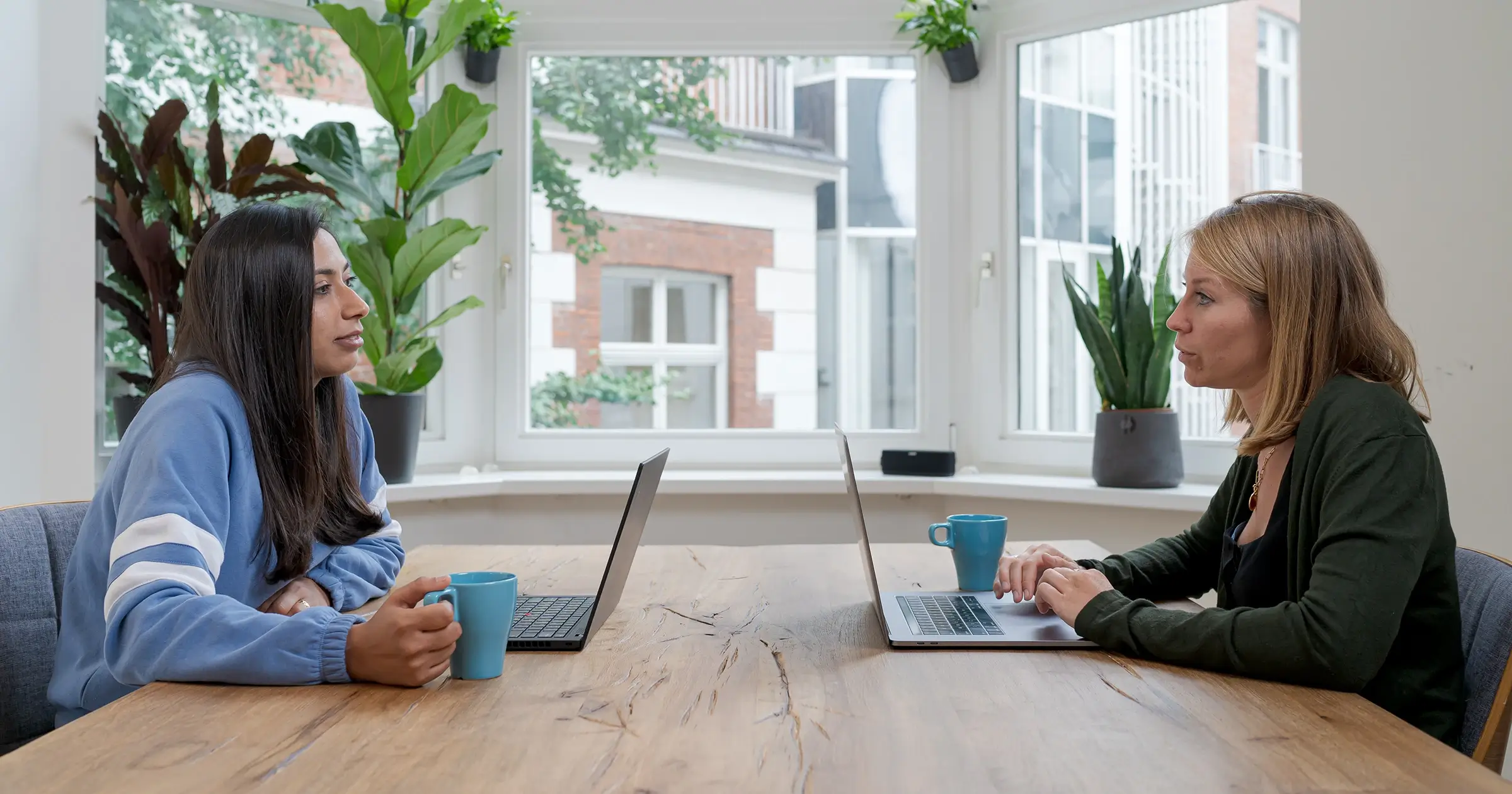The Freelancer’s Guide to Answering Questions in a Client Interview

As you've no doubt realized at one point or another, interviewing clients is a key piece of your business. Freelancing is not just the work itself; freelancing is also business development. Client interviews are paramount to your success!
If you're a little uneasy about talking to clients, have no fear. The more interviews you do, the better and more adept you'll become at answering any questions your client might have for you. And to that end, in today's post we're going to look at how you better prepare for your next client interview. But first, a quick note on being the interviewer, not the interviewee:
A client interview means you’re under consideration for the role. We know this. But you're also interviewing them as much as they are interviewing you. This means you need to prepare to answer any number of questions. It could be your past work, scope of experience, rates (the biggie!) or any other number of topics. This is your chance to establish yourself as a knowledgeable and talented freelancer. It’s important to come prepared to a client interview!
We've touched on interviewing clients before, so this month we're focusing on answering your client's questions.
5 Steps to Answering Client Questions
There are the five key points to answering questions in a client interview:
- Prepare your answers
- Know your value
- Know the discounts you do (or don’t) offer
- Be honest with your experience
- Identify your workflow
These answers will get easier with time, but it can help to take some time each week to rehearse. I often blank or stumble over words when I'm nervous, so rehearsing answers can help. A client interview can be stressful, which means preparation is key to helping you achieve outstanding results.
Preparing Your Answers to Client Questions
You'll hear some questions over and over in a client interview, but there are other questions you might not be expecting. By taking the time now, you can better prepare yourself for future interviews.
This includes a few different steps:
- Researching past projects
- Writing out mock questions
- Treating every meeting as important
If you’ve worked with a similar company already, you may already know what to say. You’ll also want to remember, though, that every company is different and may need a different approach in your answers.

Research Past Projects
If you haven't already, research the company's past projects. You may have already done this, but take some time to review. When you know their past projects, you can better answer their questions about similar clients, software, or any number of topics.
Knowing their past projects also gives you insight into how they operate. Every company is different, and it's helpful to know ahead of time. This information also shares the type of product they’re looking for. Which is especially important if you’re looking to pivot your niche! Gathering as much information as possible is key to a successful client interview.
If you’re a writer, look at their tone and how they use different collateral like eBooks and even the copy on their website. If you’re a designer, consider how they’ve incorporated their brand into their website design. If you’re a voiceover artist, listen to some of their past videos or podcasts… There's always research to be done.
This doesn’t mean you can’t suggest new ideas or methods of working. It does, however, give you some help to close the deal. This is especially important when working with older, more established companies. They've found a method that works and they rarely stray from it.
When you know a company's past projects, you can better answer their questions about similar clients, software, or any number of topics.
Create Mock Questions for Practice
Creating mock questions is one of the best ways you can prepare for a client interview. After you’ve done the research, create five to ten questions you think they may ask. Rehearsing these questions in the days leading up to your meeting can help calm your nerves.
Try role playing with a friend, saying it to your mirror, or practicing them while cooking the dinner. Do whatever it takes to create rehearsed yet natural sounding answers.
Some practice questions for your meeting can include:
- Can you share an example of a past project that’s similar to this?
- Have you had a conflict with a client in the past, and if so how did you handle it?
- Can you tell me a little about how you work?
- We have an established project management system and workflow in place. Are you comfortable working with new programs and a new workflow?
- Do you enjoy working as part of a team, or do you prefer working alone?
By doing this, you’ve given yourself the best preparation possible for the interview.
Treat Every Client Meeting as a “Big Meeting”
If there’s one piece of advice I can provide, it’s to treat every meetings as important. Not only those with a major potential client. You never know where a meeting or chance encounter could take you!
So prepare well, dress nicely, and — I don’t think I need to say this, but I will — remember your manners.
Freelancing is different from an employee relationship, but it's still a job interview. By thinking of your meeting in this way, you can ensure you’re well prepared for any questions they may ask.

Know Your Value Before Your Client Interview
One of the hardest pieces of freelancing is knowing your value. Money will come up in your interview. There are two scenarios: your client asks without previous knowledge, or they know and are looking for justification. Stand firm, my friends.
Your value encompasses a few different pieces:
- Your experience
- Financial value
- Discounts
- Pro bono work
- Friends and family
Price for Your Experience
I tend to struggle with impostor syndrome, which means I undercut the experience I have. I think my skills are less than they are, which hurts me when it comes to the money talk. All this to say, you need to be realistic, in a positive way. You probably have more experience than you realize. This all contributes to your financial value.
If you're a new freelancer, you won't be able to charge premium rates. But if you've been working for some time, then take another look at your rates. It's a balance, but remember that people equate value with cost. The more skill and value you have, the more they expect to pay.
All experience translates to increased personal value.
Discussing Finances in a Client Interview
Money is an important part of a client relationship, for obvious reasons. You need to get paid, and both parties need to agree on a cost. But it can also be a little awkward, especially if you prefer to avoid confrontation. (I’m with you.) In the interview, be prepared to politely but firmly discuss your rates. They are a business, and want to save money where possible. And as always, try to get their budget beforehand.
By knowing their budget early on in the process, you save yourself time. If they can't afford you, then you'll know and won't waste time pursuing them. The cliche “time is money” is very much a true statement in this case.
As Janna Hagan, a Toronto-based designer,explains, it’s important to be on the same level of knowledge when you sit down for the client interview.
“Many times, your clients might have a general idea, but you have no idea if they can afford it or not. Asking about a clients budget will immediately confirm whether or not you are wasting your time.
"If your client has $500 stuck in their mind, you need to be on the same page. You can then assess if you can help them out within their budget, or move onto other clients who are have appropriate budgets.
Depending on the potential client, you may have some room to negotiate. Don’t be afraid of walking away if they aren’t seeing the value of your work. It can be tempting, especially as a new freelancer! But remember that your work has value, and it’s often more than you think it is.
As Lizzie Davey, the creator of Wonderful World, says, you have the upper hand when you ask them their budget.
“…it also shows that you’re not really sure about the value of your work.
Asking a client what their budget is gives them the upper hand. What happens if they say a number that’s way lower than you were thinking? Would you walk away or would you try and adjust your pricing to match? Too many freelancers do the latter, and that’s the problem.
By stating your prices outright, the client knows exactly what to expect – then it’s THEIR decision whether they walk away or suddenly find an increase in their budget.”
She also shares a slightly different method: sharing your prices in the beginning. This means less wasted time and less miscommunication. Both methods work, and I’ve been in both situations. I prefer to know their budget first, as I can at times create a plan based on their budget. But there are also times when I know it’s time to walk away.
Don't be afraid to walk away from a client who doesn't understand your value.
Know Your Client Discount Policy
While we’re on the topic of knowing your value, it’s also important to know your stance on nonprofit discounts, pro bono work, and working with friends. I was once asked if I provided a discount for nonprofits. Up until that point I hadn’t even considered it! So before you get caught in a client interview like I was, know how you're going to respond.
Since Iwas excited about the nonprofit, they were doing great things in the community, and I was treating it as a test case for higher rates, I decided to go for it. In the proposal, I listed the non-discounted rates, then added the discount. This way, they knew it was a discount and how much it was.
This is one way to handle discounts. You may choose to never offer one, and that’s okay, too! Find what works for you, and go with it.
I always like sharing opposing viewpoints and letting you decide for yourself. This is a viewpoint from Jason Fried, co-founder of Basecamp, for treating non-profit and for-profit business the same.
“… I’ve never understood how these differences relate to pricing. Why should a non-profit organization pay less for software (or supplies or food or rent or…) than a for-profit company? How is an automatic discount for a non-profit fair to a full-price paying for-profit? They both have employees, budgets, goals, financial pressures, etc. If you don’t look at the tax code or the sign on the door, they are the same.”
He’s quick to point out that they respect the work nonprofits do, but there are also some nonprofits bringing in more revenue than some for-profit companies. And what’s to that say for-profit companies can’t do good things with their revenue? (Think Tom’s, Bombas socks, and Warby Parker. All for-profit, but they donate their product to those who need it.)
Know now rather than later how you handle nonprofit pricing.
Choosing Your Pro Bono Policy
Pro bono work is also something that varies among freelancers, and there are a number of types. It could be volunteering with a nonprofit, or working with a community event within your industry. One of the criteria you can use to decide is this: is there a chance you’ll receive more work from the event? Is it an organization that really doesn’t have the resources to pay even a discounted rate?
You don't want to always think in what you can get from it, but it's also a realistic look at business.
I’ve worked with a few conferences over the past two years, and they were all run by volunteers. We chose to get involved because of how passionate we were about the project and how it could help our careers.
I’ve signed multiple clients and have built up my community through these events! This isn’t necessary for your work, but it can provide another creative and business development avenue. As designer Jeff Fisher explains, there are instances when pro bono work is definitely beneficial.
“Doing work for a nonprofit is a great way to expand your network. Nonprofits often have a board of directors, many of whom already have their own business.”
By using pro bono work to build connections with business owners, you can work towards paying contracts.
Friends and Family Discounts as a Freelancer
And then there’s the last one: working with friends. Some advise against, and others have had good experiences. Friendships can blur the line and add stress, so it’s important to consider where you stand on the issue.
If a friend refers you to their agency for a client interview, it could be a great experience. But if you get the project and are set to work together, that could create some problems. Or, you could say, “thanks, but no thanks”.
These choices regarding discounted, pro bono, and friendships are up to you. It is important, though, to know where you stand before entering a meeting where these questions may come up.
As I tend to figure these problems out as I encounter them, I’ve had some gut instinct responses that I’ve lost money on. As Steve of I’ve Done That shares, there is a time and a place for discounts. But make sure you communicate why and consider modifying the process.
“Many experienced freelancers agree to discount their services - but for a price. Clients must commit to paying upfront for the work (usually at 100%) and they must make a bulk work order. "Because a significant portion of a freelancer’s time is spent finding new clients, having a lower pay yet steady client is a cost-effective alternative to having a higher pay but short-lived client.”
There is a way of working discount work into your business. But it also involves some insight into why you want to do it. You also need to look at if you can financially afford it, and if it will benefit the client.
Family and friends can blur the line between business and personal and increase stress.

The Most Important Piece of a Client Interview
When in a client interview, it can be tempting to overstate your skills. While there’s something to be said for the “say yes now and figure it out later” method, there’s a fine line between leaving room for you to learn and grossly over-exaggerating.
As with your resume, there is a way to paint your skills in the best color without lying. If you don’t know motion graphics, don’t say you do, because that’s not something you can learn to do well in a day. But if you have some design skills and you’re asked to design an invitation or menu and you’re up to the task, then go for it.
There is an alternative to this: contract out to a colleague. One of my favorite parts about freelancing is how community-driven it is. To continue the motion graphics example: chances are you know someone who can do it, or you know someone who knows someone. This way, you get the business and expand the scope of the project. And you can keep the client without staying up all night (after night, after night) trying to learn After Effects.
The Internet Is Making Your Job Easier
Depending on the clients you're looking for, researching clients has become much easier. Many companies have blogs (er, you’re reading one right now), which gives you an inside look at the company. While they may not be giving behind-the-scenes information, they are giving you a chance to see how they view the industry. And more importantly, how they operate.
When asked industry or company questions, focus on concrete information. As Forbes points out, focus on data-driven answers that won’t bore them. (Unless your interviewer loves data. Then by all means, go nuts!) Use an active voice, be concise, and answer their questions with poise.
Google is essentially taking over the world these days. Aside from Google Analytics and Google Drive, you also have access to Google Alerts. This provides you a chance to stay up to date on your prospective client’s company and industry.
You want to appear knowledgeable without bragging, which means showing you prepared, but that you also want to learn more.
This preparation means that you can better expect the questions they’re likely to ask. Not to mention you'll be prepared to ask better questions yourself. A good client interview is you interviewing the company as much as they are interviewing you.
Use your resources to find out crucial information before your client meetings.
Know Your Workflow
If you’ve been freelancing for a short time, you may still be finessing your workflow. That’s okay! Experimenting is an important way to find out what works for you. If you’re an established freelancer, you’ll have your process figured out.
Some businesses have their own processes in place that they'll want you to adopt. Whether it’s a type of project management software or their billing preferences, be ready to work with them. (Within reason, of course.)
It's helpful to flesh out your own workflow so you can answer your prospective client's questions.
- What are your payment terms?
- What types of payment do you accept?
- How much payment do you need up front to begin?
Some clients prefer you to bill the first of each month, while others will issue payment as soon as the deliverable is approved. While these may not be “make or break” items, you want to have as much information as possible before signing the contract.
What’s a Workflow?
Even if you haven’t put much thought into your workflow, you do have one. Your workflow is how you work, from signing your client to sending deliverables. The official definition of 'workflow' from the Oxford Living Dictionaries is:
“The sequence of industrial, administrative, or other processes through which a piece of work passes from initiation to completion.”
Okay. That seems like someone chose a mix of buzzwords and put them together, but there’s meaning in it. “The sequence of industrial, administrative, or other processes…” states that a workflow is used in both industrial and administrative settings. Every company has a workflow, whether it's a creative agency or a construction company. “… through which a piece of work passes from initiation to completion,” is the order in which you work. So Step 1, Step 2, all the way through completing the project.
Step 1 for many freelancers is signing a proposal. Then, the creative brief is completed by the client and work begins. Your workflow includes how you begin the project. It could be taking notes and sketching a rough draft, or jumping right in.
Then you'll have revisions, and your workflow will end with invoicing and finishing the contract. This workflow will increase your productivity across projects. You may have a project in the early stages, another in revisions, and yet another ending. When you know what's coming, it's easier to move between projects.
Be Ready to Sign the Contract
Depending on the client, the hardest part may be getting the check. If you're ready to sign, then you can be ready to ask for the check. This greatly depends on your client though, as well.
An owner of a web design company shared with me his technique for getting the check: be prepared. This means he brings the contract to the meeting, and offers to stop by their office that afternoon if they don’t have a check with them. His method is a bit gutsy, but it gets results.
All this to say, you need to be prepared to sign the contract. Or, at the very least provide a copy for them to review. Some clients will review and sign right away, and others may need to refer to team members. This is applicable when you’re providing the contract; you’ll definitely want to review any contracts given to you. Depending on the scope and type of project, you may want to ask a lawyer to review it, as well. By being prepared, you can be more likely to close the sale by the end of the interview. This includes answering the client’s questions skillfully, asking them the right questions, and bringing necessary documents.
A client interview may not be the most enjoyable way to spend your time, but it’s a crucial part of signing new clients. And, well, keeping the lights on. When you take the time to plan answers to anticipated questions and do your research, you’ll be more prepared for the questions your clients will ask. I know you’ll make a great first impression. You can do this!